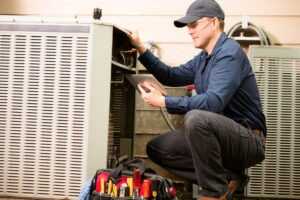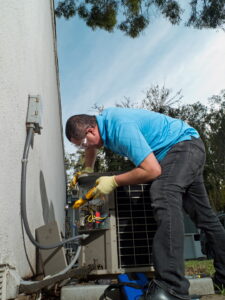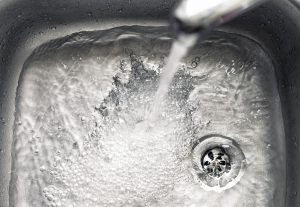
Most of the time we’ll take a spread-out approach toward air conditioners that are making noises. We talk a lot on this blog about the different types of noises and what they could mean, but we rarely ever into a single noise. That’s because, at the end of the day, it’s hard for us to diagnose your particular AC repair in Montgomery County without a proper visit by a professional. No matter what we say here in this blog post, you should always call for professional help when it’s required.
That being said, it’s time to talk about one of the most common AC noises we run across. This is the “grinding” noise, and one that can be both uncomfortable for homeowners to hear, and devastating to the functionality and efficiency of your system. If you’re wondering why an air conditioner might start making a grinding noise, then you’re in the right place. Keep reading as we uncover the truth.


 If you’re the owner of an air conditioner, then it’s probably not news to you when a professional tells you that it won’t last forever. We’d be hard-pressed to find a piece of machinery that will last forever, so this technically shouldn’t be a surprise to anyone. But many homeowners wish their air conditioners lasted a lot longer than they do, and they end up paying for that.
If you’re the owner of an air conditioner, then it’s probably not news to you when a professional tells you that it won’t last forever. We’d be hard-pressed to find a piece of machinery that will last forever, so this technically shouldn’t be a surprise to anyone. But many homeowners wish their air conditioners lasted a lot longer than they do, and they end up paying for that. This is a good question, and one that needs to be answered quickly. Refrigerant leaks are not fun to encounter, and they can spell disaster for an air conditioner. While homeowners like to think that they can just call up their neighborhood technician to get the refrigerant recharged, it’s just not that simple.
This is a good question, and one that needs to be answered quickly. Refrigerant leaks are not fun to encounter, and they can spell disaster for an air conditioner. While homeowners like to think that they can just call up their neighborhood technician to get the refrigerant recharged, it’s just not that simple. When you think about your plumbing system, what thoughts come to mind? Through all the clogs, the pipe leaks, and constant headaches which require emergency support, do you think it “just works” so it’s fine? Well, we’re here to tell you that a plumbing system that “just works” isn’t good enough anymore. The time of your galvanized steel pipes constantly leaking and a plumber telling you that it can’t get any better is over. Our team is ready to help.
When you think about your plumbing system, what thoughts come to mind? Through all the clogs, the pipe leaks, and constant headaches which require emergency support, do you think it “just works” so it’s fine? Well, we’re here to tell you that a plumbing system that “just works” isn’t good enough anymore. The time of your galvanized steel pipes constantly leaking and a plumber telling you that it can’t get any better is over. Our team is ready to help. It feels good to finally be out of the harshest parts of winter. Well, we hope that’s the case. Even if we are out of the hardest dips in temperature, you could still encounter one of the worst winter experiences: a heater problem. As long as you’re the owner of a heater, this is a reality. That’s why we talk about heating maintenance on our blog so much.
It feels good to finally be out of the harshest parts of winter. Well, we hope that’s the case. Even if we are out of the hardest dips in temperature, you could still encounter one of the worst winter experiences: a heater problem. As long as you’re the owner of a heater, this is a reality. That’s why we talk about heating maintenance on our blog so much. Look, we’d love to sell you a heater that never needed repairs and lasted forever. That would make our job a lot easier and would honestly make us famous. The problem with this mentality is that this kind of heater doesn’t exist, and when HVAC professionals try to sell you a heater that never needs repairs, they’re likely selling you on lies. All heaters, no matter the type or model, require repairs at some point in their lives.
Look, we’d love to sell you a heater that never needed repairs and lasted forever. That would make our job a lot easier and would honestly make us famous. The problem with this mentality is that this kind of heater doesn’t exist, and when HVAC professionals try to sell you a heater that never needs repairs, they’re likely selling you on lies. All heaters, no matter the type or model, require repairs at some point in their lives. Okay, this blog post might not be entirely about mesh screens, but they can play a huge role in keeping your plumbing system in good shape. If you’re on the prowl for a preventative solution that’s going to stop your pipes and drains from clogging up, then this might be the perfect thing for you.
Okay, this blog post might not be entirely about mesh screens, but they can play a huge role in keeping your plumbing system in good shape. If you’re on the prowl for a preventative solution that’s going to stop your pipes and drains from clogging up, then this might be the perfect thing for you. The heating season is a bit more complicated than the cooling season. Especially when it comes to
The heating season is a bit more complicated than the cooling season. Especially when it comes to  We’ve all been there. It’s been a long day of work and you head to the grocery store after finding out that your bathroom drain is all backed up. You don’t have time to deal with drain clogs, right? That’s why the chemical drain cleaner aisle at the store is always so enticing. These solutions are quick and easy, you just pour them down the drain and the chemicals destroy whatever is clogging your drain. Simple enough!
We’ve all been there. It’s been a long day of work and you head to the grocery store after finding out that your bathroom drain is all backed up. You don’t have time to deal with drain clogs, right? That’s why the chemical drain cleaner aisle at the store is always so enticing. These solutions are quick and easy, you just pour them down the drain and the chemicals destroy whatever is clogging your drain. Simple enough! If your first response to the title of this post is “yes,” then you’re in the right place. Gurgling drains are a noticeable sign for vigilant homeowners who want to keep their plumbing in good shape. It’s usually the sign of a partial blockage, a clog forming. Just because a clog is forming and not yet fully formed doesn’t mean there isn’t something that can be done about it. Plus, that gurgling noise isn’t the most appetizing noise to have coming out of your kitchen sink.
If your first response to the title of this post is “yes,” then you’re in the right place. Gurgling drains are a noticeable sign for vigilant homeowners who want to keep their plumbing in good shape. It’s usually the sign of a partial blockage, a clog forming. Just because a clog is forming and not yet fully formed doesn’t mean there isn’t something that can be done about it. Plus, that gurgling noise isn’t the most appetizing noise to have coming out of your kitchen sink.